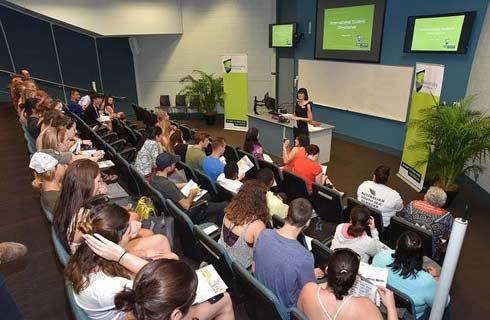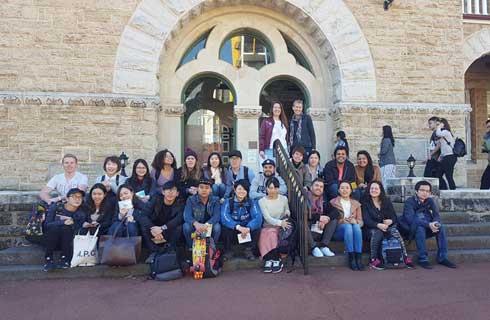- IDP China>
- 课程库>
- 计算机科学>
- 计算机与信息科学>
- 人工智能与机器人>
- Master of Science in Computer Science- Artificial Intelligence
计算机科学-人工智能理学硕士
Master of Science in Computer Science- Artificial Intelligence

学历文凭
Masters Degree

专业院系
Department of Computer Science

开学时间

课程时长

课程学费

国际学生入学条件
Entrance Exam: The Graduate Record Exam (GRE) is required. Submit GRE results not older than five years. Successful applicants have typically had GRE scores of 150 verbal and 160 quantitative or better.
GRE is waived for applicants with a bachelor of science in computer science or computer engineering from a regionally accredited institution in the United States.
English Language Proficiency: Applicants are required to have a command of oral and written English. Those who do not hold a baccalaureate or other advanced degree from the United States, OR a baccalaureate or other advanced degree from a predetermined country on the waiver list, must meet the minimum language proficiency score requirement in order to be considered for admission.
Paper-based TOEFL: 550, Internet-based TOEFL: 80, IELTS: 6.5, PTE: 53, Duolingo: 105
Resume: Submit a detailed resume indicating your work experience and background.
Letters of Recommendation: Two letters from references who can evaluate your work and/or academic achievements are required.
IDP—雅思考试联合主办方

雅思考试总分
6.5
- 雅思总分:6.5
- 托福网考总分:80
- 托福笔试总分:550
- 其他语言考试:PTE - 53
CRICOS代码:
申请截止日期: 请与IDP联系 以获取详细信息。
课程简介
The concentration in artificial intelligence provides students with an in-depth understanding of the principles and technologies used to embody machines with human-like intelligent capabilities. Students taking this concentration will have an opportunity to learn, as well as perform hands-on experiments in different areas of artificial intelligence such as software agents, multi-agent and multi-robot systems, machine vision and image processing technologies, neural network based adaptive software systems, heuristics and stochastic optimization techniques for critical decision making, machine learning and knowledge engineering techniques for embedding intelligence in computers and information systems.<br>Students completing this program will be able to:<br>Demonstrate the ability to create basic computational artifacts. Demonstrate knowledge of computing systems and their integration.<br>Explain how computing permeates today's society, including security, privacy, and ethical considerations.<br>Apply appropriate pedagogical content knowledge in the teaching of computing topics.<br>Describe relevant and recent research findings in computer science education including how they might be applied in the classroom.
相关申请
 预科
预科 奖学金
奖学金 实习机会
实习机会 在校学习
在校学习 跨境学习
跨境学习 校园授课-线上开始
校园授课-线上开始 在线/远程学习
在线/远程学习
开学时间&学费
学费信息仅供参考,请与IDP联系以获取详细信息
| 开学时间 | 时长 | 学费 | 地点 |
|---|
关于内布拉斯加大学奥马哈分校

位于内布拉斯加州奥马哈市的内布拉斯加大学奥马哈分校(UNO)是特立独行者(Mavericks)的故乡--他们是世界上独立的思考者、探索者和冒险者。在 UNO 接受高等教育期间,学生可以通过实践学习和体验获得无限的成长机会。世界在这里相遇。UNO 拥有 15300 多名学生,他们来自全球 80 多个国家。无论学生是想在 IT、商业、健康还是通信领域开展职业生涯,UNO 的六个学院都提供了广泛的本科和研究生学术课程。在 UNO,学生可以通过学术途径找到自己想要的职业,还可以通过小班教学与大学的专家教师一起接受更加个性化的教育,而且学费低廉,是该地区学费最低的大学之一。UNO 的相关学习机会和全球影响力帮助毕业生成为专业人士和社区的积极成员。
本校相关课程

Bachelor of Science in Bioinformatics (College of Arts and Sciences)
学历文凭
Bachelor Degree
开学日期
课程费用总额


生物学理学学士
学历文凭
Bachelor Degree
开学日期
课程费用总额


分子和生物医学生物学理学学士
学历文凭
Bachelor Degree
开学日期
课程费用总额


黑人研究文学士
学历文凭
Bachelor Degree
开学日期
课程费用总额


化学理学学士
学历文凭
Bachelor Degree
开学日期
课程费用总额


Bachelor of Arts in Economics
学历文凭
Bachelor Degree
开学日期
课程费用总额

其他相关课程

Doctor of Philosophy in Computer Science- AI and Robotics
 里海大学
里海大学泰晤士高等教育世界大学排名:672
学历文凭
Ph.D.
开学日期
课程费用总额


Master of Science in Electrical and Computer Engineering - Robotics and Autonomous Systems (Human Robot Interaction)
 密歇根大学安娜堡分校
密歇根大学安娜堡分校学历文凭
Masters Degree
开学日期
课程费用总额


Master of Science in Aerospace Engineering - Manufacturing and Robotics
 加州州立大学长滩分校
加州州立大学长滩分校学历文凭
Masters Degree
开学日期
课程费用总额


Doctor of Philosophy in Human-Centered Computing
 佐治亚理工学院
佐治亚理工学院泰晤士高等教育世界大学排名:41
学历文凭
Ph.D.
开学日期
课程费用总额


Master of Science in Robotics
 加州大学河滨分校
加州大学河滨分校学历文凭
Masters Degree
开学日期
课程费用总额


数字媒体信息学文学士
 威得恩大学-国际学习中心(StudyGroup)
威得恩大学-国际学习中心(StudyGroup)学历文凭
Bachelor Degree
开学日期
课程费用总额









